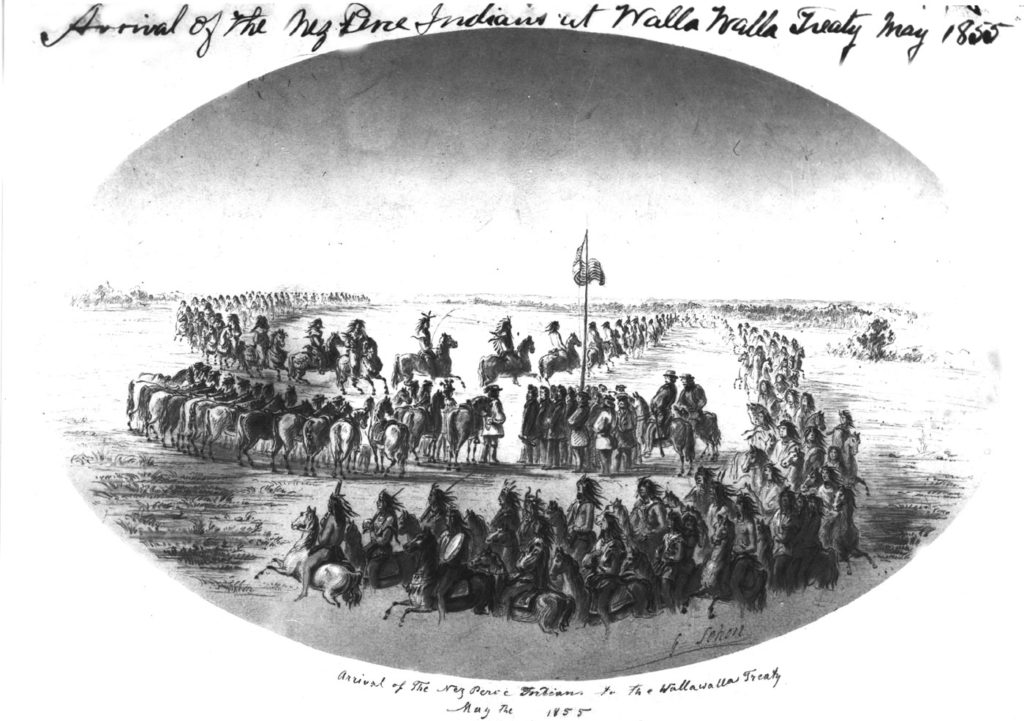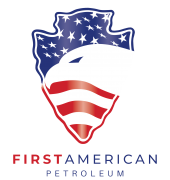TREATY OF 1855
June 9, 1855. | 12 Stat., 951. | Ratified Mar.8,1859. Proclaimed Apr. 18, 1859.
Articles of agreement and convention made and concluded at the treaty-ground, vens, Walla-Walla Valley, this ninth day of June, in the year one thousand eight hundred and fifty-five, by and between Isaac I. Stevens, governor and superintendent of Indian affairs for the Territory of Washington, on the part of the United States, and the undersigned head chiefs, chiefs, headmen, and delegates of the Yakama, Palouse, Pisquouse, Wenatshapam, Klikatat, Klinquit, Kowwas-say-ee, Li-ay-was, Skin-pah, Wish-ham. Shyiks, Ochechotes, Kah milt-pah, and Se-ap-cat, confederated tribes and bands of Indians, occupying lands hereinafter bounded and described and lying in Washington Territory, who for the confederated tribes and bands of Indians, occupying lands hereinafter bounded and described and lying in Washington Territory, who for the acting for said tribes and bands, and being duly authorized thereto by them.
TREATY OF 1855
June 9, 1855. | 12 Stat., 951. | Ratified Mar.8,1859. Proclaimed Apr. 18, 1859.
Articles of agreement and convention made and concluded at the treaty-ground, vens, Walla-Walla Valley, this ninth day of June, in the year one thousand eight hundred and fifty-five, by and between Isaac I. Stevens, governor and superintendent of Indian affairs for the Territory of Washington, on the part of the United States, and the undersigned head chiefs, chiefs, headmen, and delegates of the Yakama, Palouse, Pisquouse, Wenatshapam, Klikatat, Klinquit, Kowwas-say-ee, Li-ay-was, Skin-pah, Wish-ham. Shyiks, Ochechotes, Kah milt-pah, and Se-ap-cat, confederated tribes and bands of Indians, occupying lands hereinafter bounded and described and lying in Washington Territory, who for the confederated tribes and bands of Indians, occupying lands hereinafter bounded and described and lying in Washington Territory, who for the acting for said tribes and bands, and being duly authorized thereto by them.

Securing the rights of the Yakama Nation
COURT RULINGS
1855
1886
1919
1979
2019
1871
1905
1942
1995
COURT RULINGS
Securing the rights of the Yakama Nation
1855
1871
1886
1905
1919
1942
1979
1995
2019
For those who came before us, for our fellow Native Americans and their communities, and for our generations yet to come, First American dedicates itself to honoring the history and culture of our heritage by standing in defense of, and exercising the rights and freedoms guaranteed to us by our ancestors when they signed the Treaty of the Yakama Nation, 1855. We are proud to be joined in this struggle for justice and equality by some of the nation’s most prestigious legal firms; together, we honor the past by securing our future.
For those who came before us, for our fellow Native Americans and their communities, and for our generations yet to come, First American dedicates itself to honoring the history and culture of our heritage by standing in defense of, and exercising the rights and freedoms guaranteed to us by our ancestors when they signed the Treaty of the Yakama Nation, 1855. We are proud to be joined in this struggle for justice and equality by some of the nation’s most prestigious legal firms; together, we honor the past by securing our future.

ABOUT US
First American Petroleum, A Yakama Nation Corporation, is the largest Native American owned Wholesale Fuel Provider to Tribal Lands in the country. We are proud to be a Native company, Indians helping Indians. This is our word. From us to you, Naye.
GET IN TOUCH
- 509.314.6083
- 509.314.6085
- Info@Firstamericanltd.com
-
61 West Wapato Road
Wapato, WA 98951
